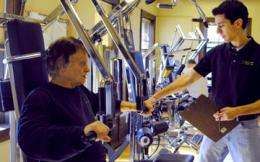Exercise important for those at risk of Alzheimer's

November is National Alzheimer’s Disease Awareness Month, bringing calls to make this disease a national and personal priority. As the population ages, people are searching for hope in the fight against Alzheimer’s. While evidence does suggest that physical activity is associated with maintenance of cognitive function across the lifespan, most of this research has been done with healthy people, without any consideration of their risk for Alzheimer’s.
New research shows the importance of exercise for those at special risk for Alzheimer’s disease.
A recently published study authored by University of Wisconsin-Milwaukee Assistant Professor J. Carson Smith studied individuals who carry a high-risk gene for Alzheimer’s disease, as well as other healthy older adults without the gene.
“Our study suggests that if you are at genetic risk for Alzheimer’s disease, the benefits of exercise to your brain function might be even greater than for those who do not have that genetic risk,” says Smith.
A team of researchers compared brain activation during memory processing in four separate groups of healthy 65- to 85-years-olds. Low and high risk were defined by whether or not an individual carried the apolipoprotein E-epsilon4 (APOE–ϵ4) allele. Physical activity status was defined by how much and how often the participants reported being active. The study divided subjects into Low Risk/Low Physical Activity (PA), Low Risk/High PA, High Risk/Low PA and High Risk/High PA.
Brain activation was measured using functional magnetic resonance imaging (fMRI) while participants performed a famous name discrimination task. This test is very useful, says Smith, because it engages a wide network called the semantic memory system, with activation occurring in 15 different functional regions of the brain. “When a person thinks about people – for example, Frank Sinatra or Lady Gaga – that involves several lobes of the brain,” explains Smith.
In the study groups of those carrying the gene, individuals who exercised showed greater brain activity in memory-related regions than those who were sedentary.
Perhaps even more intriguing, physically active people with the gene had greater brain activity than those who were physically active but not gene carriers.
The “why” behind this particular result is a subject for further study, says Smith. “There are many physiological reasons why this could be happening. For example, people with this increased activation might be compensating for some underlying neurological event that is involved in cognitive decline,” he says. “Using more areas of their brain may serve as a protective function, even in the face of disease processes. So yes, there is hope for exercise in the fight against Alzheimer’s disease.”
In addition to Smith, who is in the department of Human Movement Sciences in the College of Health Sciences at UWM, the study was conducted in collaboration with the Cleveland Clinic, Marquette University, Wayne State University, and Rosalind Franklin University of Medicine and Science. It was funded by the National Institutes of Health and the National Institute on Aging.
The study will be published in Vol. 54 of the journal NeuroImage and is available online.
Smith’s current research builds on this study. He and his team are conducting a new study on the before-and-after effects of a structured exercise program on brain function. The study includes patients diagnosed with mild cognitive impairment or early Alzheimer’s disease, as well as a healthy “control” group.
Participants receive two days of extensive testing, including blood tests, a neuro-psychological examination with an interviewer and graded exercise test, and an MRI brain scan. Subjects then exercise with the supervision of a personal trainer for 12 weeks, four days a week, for 30 minutes a day.
More information: After the 12 weeks, all of the testing is repeated. This is an ongoing study and is currently recruiting participants. The study coordinator, Karen Outzen, can be contacted at 414-229-5597, or visit www.exerciseforbrainhealth.com/ for more information.


















